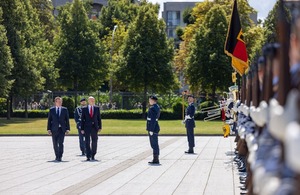Joint Defence Declaration signed with Germany on 48-hr defence diplomacy drive by defence secretary
A new joint defence declaration with Germany has been signed by the Defence Secretary

UK Defence Secretary John Healey and German Defence Secretary Borris Pistorius walking in front of a ceremonial military guard.
-
John Healey MP makes first visits as new Defence Secretary to France, Germany, Poland and Estonia.
-
In Germany he signed the most comprehensive joint defence declaration agreeing to closer cooperation as the first step in a deep new UK-German defence relationship.
-
Defence Secretary meets with counterparts as part of the UK Government’s reset of relationships with European Allies – and thanks UK service personnel defending NATO’s eastern border.
A new joint defence declaration with Germany has been signed by the Defence Secretary as part of a 48-hour drive of defence diplomacy, making his first visits to France, Germany, Poland, and Estonia.
Meeting counterparts across Europe, the Defence Secretary will set out the new government’s commitment to deepen defence ties with European allies, within a ‘NATO-first’ defence strategy.
It follows last week’s European Political Community Summit, hosted in the UK, where the Prime Minister Keir Starmer fired the starting gun on resetting relations with Europe.
In a demonstration of how European security is the new government’s foreign and defence priority, the Defence Secretary and his German counterpart signed a new joint declaration on closer defence cooperation. This will be the most comprehensive defence agreement that has been signed between the UK and Germany.
Our international alliances are a crucial component of a secure Britain, and domestically the Government will ensure that defence and security are at the heart of economic growth and the prosperity of the UK.
Last night, the Defence Secretary met counterparts in France, alongside the Chiefs of Defence Staff from both nations, and thanked British personnel helping to support security at the Paris Olympics.
In Germany, the Defence Secretary signed a joint declaration, committing the UK and Germany to deepen defence cooperation. This the first step of a new defence relationship between the UK and Germany and a new UK German Defence Agreement as discussed by Olaf Scholz and Keir Starmer at the recent NATO Summit.
On Thursday, the Defence Secretary will travel to Estonia to meet UK military personnel deployed to protect NATO’s eastern border with Russia. He will pay tribute to the role UK forces are playing in the region as an example of how NATO is the cornerstone of Europe’s defence. On the visit, he will present personnel with the wider service medal.
As part of the UK’s joint defence declaration with Germany today, ministers are expected to agree six defence priorities for closer working following Putin’s illegal invasion of Ukraine, recognising the need to collaborate more closely to defend our shared values and reaffirm our commitments to NATO and collective security in Europe.
Defence Secretary John Healey, said:
In our third week, this Government is getting on with the job and resetting our relationships with European Allies to make Britain secure at home and strong abroad.
These visits send a clear message that European security will be this government’s first foreign and defence priority.
Our new defence declaration between the UK and Germany will kickstart a deep, new defence relationship, built on our nations’ shared values. And in France, Poland and Estonia we will continue to strengthen our defence ties with our European Allies – as we all stand steadfast behind Ukraine.
It is a privilege to visit and thank our British troops defending NATO’s eastern border with Russia. Their presence and fortitude in the face of Putin’s aggression shows that NATO is the cornerstone of European defence.
Objectives set out in Wednesday’s joint declaration include strengthening UK and German defence industries, reinforcing Euro-Atlantic security, improving the efficiency of joint operations, confronting evolving security challenges such as the cyber domain, and supporting Ukraine.
Both countries are among the biggest providers of military and economic support to Ukraine. The UK government will continue to do so by providing £3bn of military support every year until Ukraine wins and ramping up and speeding up the delivery of vital military aid.